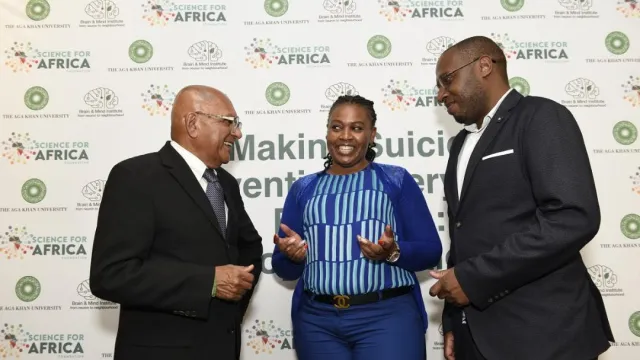Experts seek measures to counter rising tide of suicide among youth

Aga Khan University Founding Director Brain and Mind Institute Prof. Zul Merali, Ministry of Health, Mental Health Division, Psychiatrist Dr. Katherine Wanjiku & Science for Africa Foundation Programme Manager, Dr. Byron Bitanihirwe during a Youth suicide prevention forum at the university where experts called for collective action to address the youth suicide rate in the country.
In Kenya and across Africa, scarce access to mental health services continue to leave communities suffering as suicide evolves into one of the biggest public health challenges.
Statistics show that suicide continues to affect an increasing number young people across the continent, and despite being a preventable challenge, those affected suffer stigma.
As part of a bold plan to counter the challenge, the Aga Khan University’s Brain and Mind Institute (BMI), in liaison with the Science for Africa Foundation (SFA), hosted public health experts under Youth Suicide Prevention Forum to explore measures in which policymakers can provide solutions.
The forum themed “Making Suicide Prevention Everyone’s Business: Hope in Action,” experts delved into way in which stigma continues to silence conversations around suicide, the need to reframe public narratives, and strategies for expanding affordable, youth-friendly access to mental health services.
The meeting in Nairobi brought together researchers, policymakers, youth leaders, and individuals with lived experience to spotlight solutions and build a collective commitment to suicide prevention.
It also reflected on Kenya’s milestone 2023 decision to decriminalize suicide, emphasizing the importance of sustained action to translate policy into meaningful impact.
Speaking at the event, Prof. Zul Merali, Founding Director of BMI, highlighted the societal dimension of suicide, noting: “When young people are silenced by stigma or denied access to affordable care, we all fail. This forum is about creating safe spaces, amplifying youth voices, and building actionable pathways that save lives. Suicide prevention must become everyone’s business.”
With suicide ranking among the leading causes of death for adolescents and young adults globally, and young people in Sub-Saharan Africa facing increasing mental health risks due to unemployment, social pressures, and limited access to care, the forum underscored the urgency of coordinated action.
The discussions also emphasized the need for stronger cross-sector collaboration, bringing together health systems, education, community structures, and faith organizations to deliver integrated responses that can effectively prevent suicide and improve mental health outcomes.
Dr. Judy Omumbo, Head of Programmes at the Science for Africa Foundation, echoed this call for collaboration, adding: “Suicide prevention is a profound moral and social responsibility and not a marginal issue to be left to health systems alone. It touches every part of society: families, schools, workplaces, faith communities, governments, and local communities across Africa. Preventing suicide must therefore be everyone’s business.”
Adding on policy, Dr. Catherine Wanjiku, Psychiatrist, Mental Health Division, Ministry of Health highlighted the government’s commitment to suicide prevention, stating, “The government has taken significant steps, including the decriminalization of suicide in Kenya, which marked a turning point in addressing this challenge. Through the Suicide Prevention Strategy 2021–2026, we are strengthening mental health policies, expanding community-based services, and integrating suicide prevention into national health strategies to ensure timely support reaches every young person in need.”
Central to the forum was the inclusion of personal testimonies that brought the statistics to life and highlighted the importance of open dialogue. Stories of resilience and recovery illustrated how stigma often silences young people, but also how timely support, peer networks, and safe spaces can foster healing and hope.
The forum represented a critical step toward fostering collaborative, evidence-based, and community-driven approaches to suicide prevention in Kenya and across Africa.
By centring youth voces, strengthening policy responses, and grounding solutions in evidence, the initiative aims to reduce stigma, improve access to care, and inspire collective action that saves lives.




